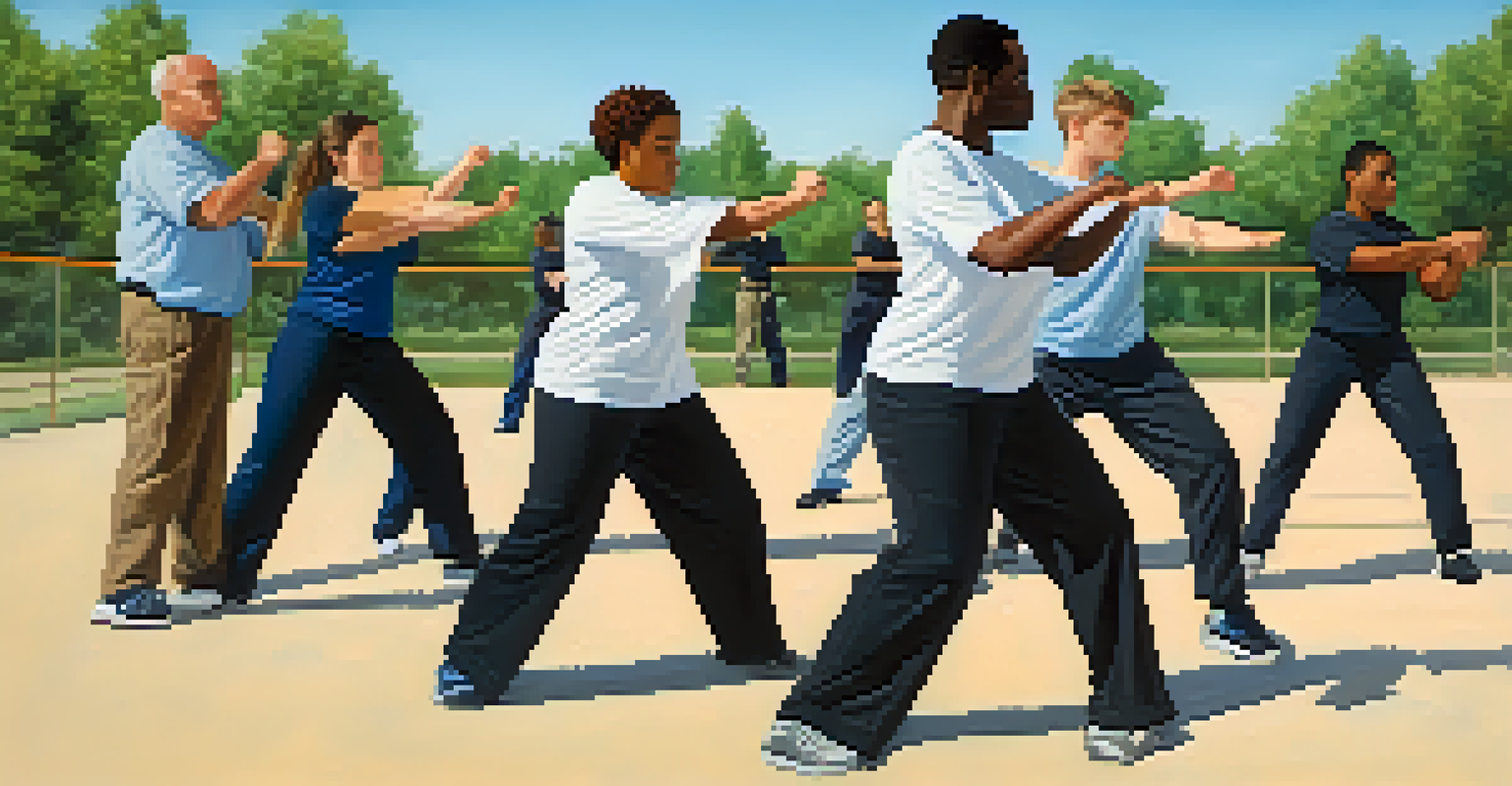The Connection Between Calmness and Self Defense Skills

Understanding Calmness in High-Stress Situations
Calmness is often described as a state of mental peace, even in chaos. In self-defense scenarios, this mental clarity allows individuals to assess threats without being overwhelmed. Imagine a deer caught in headlights versus a gazelle effortlessly maneuvering away; the difference lies in calmness under pressure.
Calmness is the cradle of power.
When faced with danger, a calm demeanor can enable quicker and more effective decision-making. Instead of panicking, a person can analyze their surroundings and choose the best course of action. This ability to stay grounded is not just instinctual; it can be cultivated through practice and training.
Moreover, maintaining calmness can significantly reduce the likelihood of escalating a confrontation. By staying composed, one can often defuse a potentially violent situation with clear communication and assertiveness rather than aggression.
The Role of Training in Developing Calmness
Self-defense training often emphasizes techniques that build confidence, which in turn fosters a sense of calm. Regular practice allows individuals to familiarize themselves with various scenarios, making them less likely to freeze when faced with real threats. Think of it like learning to swim; the more you practice, the more comfortable you become in the water.

Martial arts, for instance, incorporate breathing exercises and meditation into their training regimens. These practices not only enhance physical skills but also promote mental tranquility. Over time, this dual training can significantly improve one's overall ability to maintain calmness.
Calmness Aids Decision-Making
Maintaining calmness allows individuals to make quicker and more effective decisions in high-stress situations.
Being well-trained means you have a toolkit of responses at your disposal. This preparedness breeds a sense of ease, allowing practitioners to confidently navigate tense situations without losing their heads.
Calmness Enhances Situational Awareness
Situational awareness is the ability to perceive and understand what’s happening in your environment. Calmness sharpens this skill, enabling individuals to notice subtle cues that might indicate a threat. For instance, someone who is calm might pick up on a person’s body language or tone that signals aggression, allowing them to react appropriately.
In the midst of chaos, there is also opportunity.
In contrast, when panic sets in, people often overlook essential details, which can lead to poor decision-making. Imagine trying to drive in a storm; if you're focused on your fear, you might miss crucial road signs or signals from other drivers. Similarly, maintaining calmness helps keep your mind sharp and focused.
Through training, individuals can learn to enhance their situational awareness, which is critical in self-defense. This heightened awareness, combined with calmness, allows for proactive rather than reactive responses.
The Psychological Benefits of Calmness
Calmness doesn't just affect physical abilities; it also significantly impacts mental health. A calm mindset can reduce stress and anxiety, which are common reactions to perceived threats. When individuals practice techniques that promote calmness, such as mindfulness or deep breathing, they equip themselves to handle not just self-defense situations but life’s challenges.
Additionally, a calm approach can lead to a greater sense of empowerment. Knowing that you can remain composed in tough situations can boost self-esteem and confidence. It’s like standing tall at the top of a mountain, knowing you've conquered your fears.
Training Enhances Calmness
Self-defense training builds confidence and familiarity with scenarios, fostering a sense of calm under pressure.
Over time, these psychological benefits create a positive feedback loop. As individuals become more adept at handling stress, their self-defense skills improve, leading to even greater calmness in future situations.
Calmness and De-escalation Strategies
In self-defense, not every situation requires a physical response; often, calmness can help de-escalate conflicts before they turn violent. Using a calm voice, open body language, and empathetic understanding can shift the dynamics of a confrontation. Picture a firefighter talking down someone in distress; their calm presence can often diffuse tension.
Training in verbal de-escalation techniques can empower individuals to manage potentially dangerous situations effectively. This skill not only enhances personal safety but can also protect others around them. By creating a non-threatening atmosphere, calmness can often prevent a situation from spiraling out of control.
Moreover, practicing these strategies in controlled environments leads to better outcomes in real-life scenarios. The more individuals rehearse these techniques, the more instinctual they become, reinforcing the importance of calmness.
Mindfulness Practices to Enhance Calmness
Mindfulness is the practice of being present and fully engaged in the moment without judgment. Incorporating mindfulness into your daily routine can significantly enhance your ability to remain calm during stressful situations. Simple practices like focused breathing or meditation can create a strong foundation for handling unexpected challenges.
For those involved in self-defense training, integrating mindfulness can lead to improved reaction times and decision-making. When you train your mind to stay present, you’re less likely to get caught up in anxiety about what could happen next. It’s much like tuning a musical instrument; when done correctly, everything flows harmoniously.
Mindfulness Boosts Composure
Incorporating mindfulness practices into daily routines enhances the ability to remain calm during stressful encounters.
As practitioners become more attuned to their thoughts and emotions, they can better manage stress responses and maintain composure. This awareness can ultimately translate into increased effectiveness in self-defense situations.
Building a Lifestyle of Calmness for Better Self-Defense
Embracing a lifestyle that prioritizes calmness can have far-reaching benefits, especially regarding self-defense. This lifestyle includes adopting healthy habits like regular exercise, proper sleep, and stress management techniques. When your body and mind are well taken care of, you’re more likely to respond calmly in tense situations.
Moreover, surrounding yourself with supportive communities or engaging in group classes can enhance your sense of calm. This social aspect can be incredibly grounding, providing a network of like-minded individuals who reinforce positive behaviors. It’s like being part of a team; everyone lifts each other up.

Ultimately, cultivating calmness is a continual journey. By integrating these principles into your daily life, you’re not just preparing for potential threats but also enhancing your overall well-being.